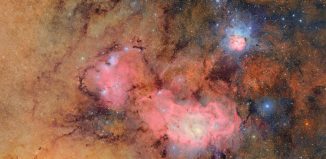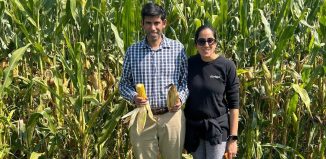SBU professor’s goal: to demystify the computer
Donald Porter, recipient of NSF Career Award, works on ‘cloud’ computing
Donald Porter was such a childhood fan of Sesame Street that he named his computer lab at Stony Brook OSCAR (for Operating System Security Concurrency and Architecture). His desktop is Kermit and his favorite 48-core test machine is Miss Piggy.
An assistant professor who joined Stony Brook just over a year ago, Porter, like the charming Muppets of his youth, is driven by a desire to teach.
Indeed, his promising research and dedication to teaching recently helped him win a prestigious Career award from the National Science Foundation, which recognizes promising junior faculty members around the country. The NSF will give his lab $400,000 over the course of five years.
“It’s very exciting,” he said. “This will give me funds to hire graduate research assistants, buy computing equipment and do other things that will help me get my research agenda going.”
Porter, who teaches a graduate course on operating systems, said when he explains something to students, it often winds up helping him with his research by forcing him to distill his thoughts.
“If you can’t teach someone else why things are the way they are, it may be hard to make them better in a clear way,” he suggested.
He said his teaching philosophy is to “demystify the computer, so people can really understand what’s going on.”
In a graduate-level operating systems course, he gives students a system developed at MIT in which there are “holes” in a source code. The students have to write the key pieces of the software themselves, including memory management, switching one running program to another, a network-card driver and the file system.
“There is no better way to understand how operating systems perform these central tasks than to write them yourself,” he advocates.
Associate professor Erez Zadok, who has been at Stony Brook for over a decade and has been teaching the popular graduate operating systems course since he arrived, applauded his colleague.
“There’s a small window when you can win this very prestigious award,” Zadok said. “We were delighted to hear he’d won it on the first shot, no less. It’s quite an achievement.”
As for his research, Porter works in an area called cloud computing, where a single computer can use several operating systems at the same time. The technique allows Apple computer users, for example, to run a Windows program at the same time they are also using a Mac operating system.
The process involves sharing resources, software and information. The concept not only allows those who own different hardware to use the software from other computers, but also allows businesses to adjust their technology resources to meet unpredictable demand.
“You can think of the cloud as very cheap, short-term computer rentals,” Porter said. “If you were launching a new product you could temporarily and affordably rent extra servers in the cloud to help meet peak demand for extra orders.”
Porter thinks about ways to divide the labor among the various parts of a computer functioning at the same time. He explained that the numerous systems — the hardware, the operating system, the language system, and the application library, to name a few — work at the same time and may interfere with each other. He wants to look closely at whether there are “better interfaces that make common problems less common.”
Porter hopes his research has a practical impact on industry and on the ways people use and interact with computers.
Porter doesn’t have a statue of Oscar or a puppet in his lab yet. If he needed one, he might borrow something from his wife, Lindsay Porter, a first- and second-grade teacher at Love of Learning Montessori School in Centerport.
“I owe a certain amount of my success to the support of my wife,” Porter acknowledges. “She put up with long hours and flak under deadline and also provided emotional and spiritual support.”
The Porters live in Setauket, an easy ten-minute bike ride to OSCAR and friends at his computer science lab. They moved just over a year ago after he earned his doctorate from the University of Texas at Austin.
“It’s easy to feel like this is home,” offered Porter.






